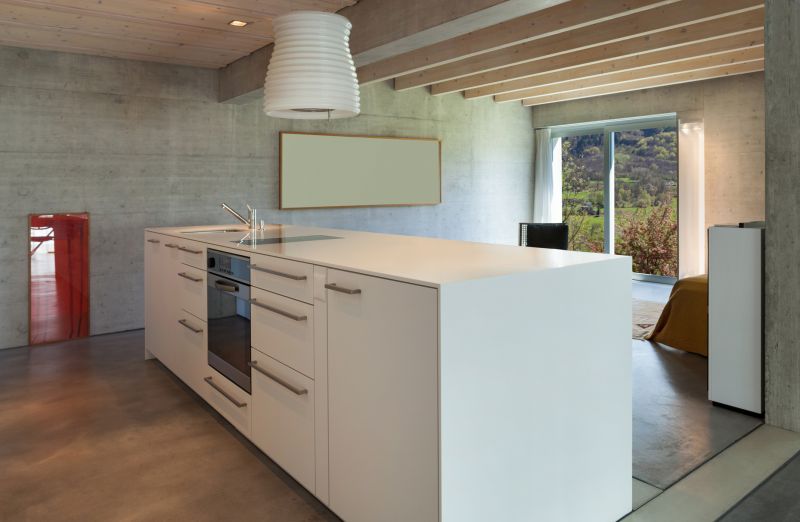Top-Rated Products for Concrete Countertop Installation Professionals
A curated selection of high-performance tools and materials favored by experts in concrete countertop craftsmanship.
 Concrete countertops are a versatile and customizable option for many interior and exterior spaces. Their durability and aesthetic appeal make them a popular choice among homeowners and designers alike. Installing a concrete countertop requires a combination of proper preparation, suitable tools, and quality products to ensure a successful outcome. From molds and sealers to finishing tools, selecting the right products can significantly influence the final appearance and longevity of the installation.
Concrete countertops are a versatile and customizable option for many interior and exterior spaces. Their durability and aesthetic appeal make them a popular choice among homeowners and designers alike. Installing a concrete countertop requires a combination of proper preparation, suitable tools, and quality products to ensure a successful outcome. From molds and sealers to finishing tools, selecting the right products can significantly influence the final appearance and longevity of the installation.
Top Overall Option
High-Quality Concrete Sealer
A reliable concrete sealer is essential for protecting the surface from stains, moisture, and wear. It helps maintain the appearance of the countertop over time and is suitable for both indoor and outdoor applications. Choosing a sealer with easy application and good coverage can simplify maintenance and preserve the aesthetic appeal of the concrete surface.
Types of Products For Concrete Countertop Installations
Concrete Molds
Flexible and rigid molds made from silicone, plastic, or wood shape the concrete and define the countertop's final form.
Mixing Tools
Buckets, mixers, and paddles facilitate thorough mixing of concrete to achieve the desired consistency and workability.
Reinforcement Materials
Rebar, wire mesh, and fiberglass mesh strengthen the concrete and prevent cracking.
Colorants and Aggregates
Pigments and decorative aggregates add visual interest and customize the appearance of the concrete surface.
Finishing Trowels and Floats
Tools for smoothing and shaping the surface during the casting process.
Grinding and Polishing Pads
Abrasive pads and discs are used to refine the surface for a smooth, polished finish.
Sealers and Curing Compounds
Products that protect the concrete surface and aid in proper curing for durability.
Surface Etching and Texturing Tools
Tools to create decorative textures or slip-resistant surfaces on the concrete.
Edge Forms and Trims
Accessories that define the edges and borders of the countertop for a finished look.
Cleaning and Maintenance Products
Specialized cleaners and conditioners to preserve the surface over time.
Popular Choices
Durable buckets designed for mixing concrete efficiently and evenly.
Flexible molds that allow for intricate shapes and detailed designs.
Fiberglass or wire mesh that provides structural support to the concrete surface.
Powdered pigments that can be mixed into the concrete for vibrant and consistent coloring.
Abrasive pads used to achieve a smooth, glossy finish on concrete surfaces.
Brushes, rollers, or spray systems for applying protective sealers evenly.
Materials used to retain moisture during curing and prevent cracking.
Pre-formed trims that provide clean, finished edges for concrete countertops.
Hand tools or stamps used to add decorative textures to the concrete surface.
Specialized cleaners to maintain the appearance and integrity of concrete surfaces.
The process often begins with selecting the appropriate mold materials, which can include silicone, wood, or flexible plastics, to shape the concrete. Once the countertop is cast, finishing products such as trowels, grinders, and polishing pads are used to achieve the desired surface texture and smoothness. Sealers and curing compounds are then applied to protect the surface from stains and moisture, extending the lifespan of the concrete.
Additionally, accessories like colorants, aggregates, and reinforcement materials can be incorporated to add visual interest and structural integrity. Properly chosen products not only enhance the aesthetic qualities but also contribute to the durability and maintenance of the concrete surface. Whether for a kitchen island, bathroom vanity, or outdoor bar, understanding the range of available products helps ensure a successful concrete countertop project from start to finish.
Key Buying Considerations
- Compatibility with concrete type and project scope
- Ease of application and user-friendliness of the product
- Durability and resistance to stains, moisture, and wear
- Compatibility with decorative elements like colorants and aggregates
- Application method requirements (brush, spray, roller, etc.)
- Curing time and process requirements
- Level of surface finish achievable (smoothness, gloss, texture)
- Structural reinforcement compatibility for heavy-use surfaces
- Availability of replacement parts or additional accessories
- Product safety and handling instructions
- Long-term maintenance and reapplication needs
- Brand reputation and product reviews
- Price point relative to project budget
- Environmental conditions where the surface will be installed (indoor/outdoor)
